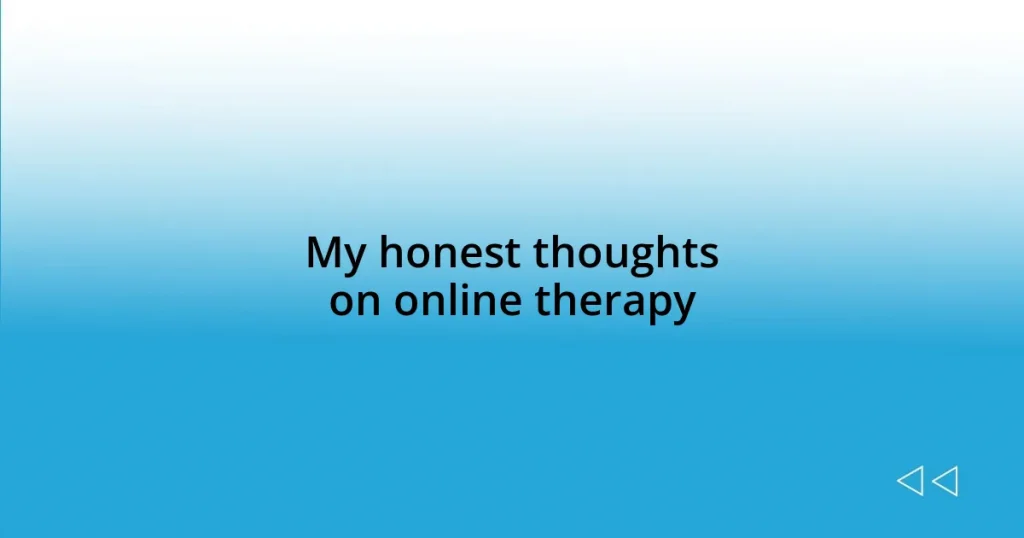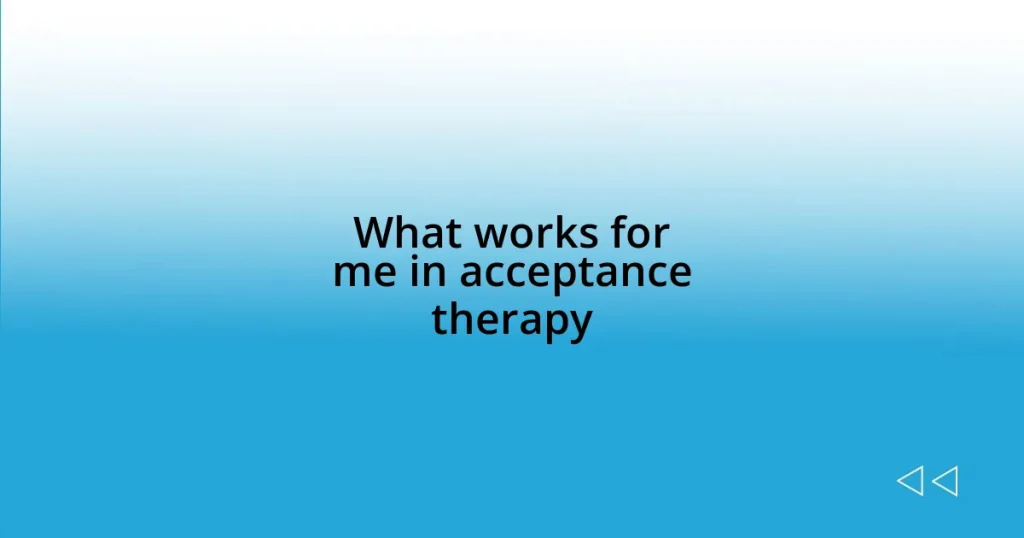Key takeaways:
- Online therapy offers convenience, increased access to diverse therapists, and a comfortable environment that can enhance the therapeutic experience.
- Common concerns include the lack of in-person connection, privacy issues, technology challenges, perceived ineffectiveness, and home distractions.
- Choosing a therapist should focus on their specialization, logistical compatibility, and personal comfort level during initial sessions.
- Utilizing tools like video conferencing, secure messaging, and progress tracking apps can significantly improve communication and therapy effectiveness.

Benefits of Online Therapy
One of the standout benefits of online therapy is the convenience it offers. I remember a time when I was juggling a demanding job and a packed schedule—it felt impossible to make time for therapy sessions. With online therapy, I could connect with my therapist from the comfort of my home, fitting sessions around my life instead of the other way around. Isn’t it liberating to think that you can prioritize your mental health without the hassle of commuting?
Another compelling aspect is the increased access to diverse therapists. I’ve often heard people express frustration over limited options in their local area. But online therapy opens doors that were once closed, allowing individuals to find a therapist whose specialization aligns perfectly with their needs, no matter where they are. Isn’t it incredible to think that someone could connect with a specialist in trauma or anxiety right from their living room?
Lastly, let’s talk about comfort. I’ve found that talking about intimate details is sometimes daunting, especially face-to-face. In online therapy, that barrier seems to melt away; the familiar surroundings of home create a safe space. Have you ever felt more at ease discussing vulnerabilities when you’re in your cozy pajamas? This sense of safety can lead to deeper conversations and insights, making the therapeutic process even more impactful.
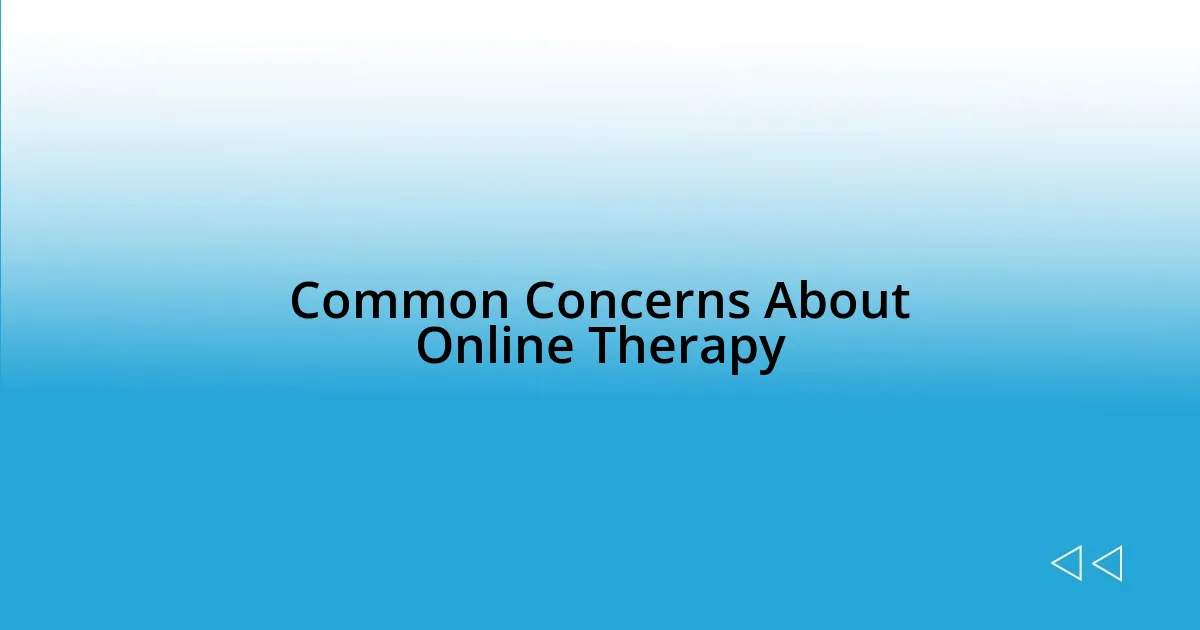
Common Concerns About Online Therapy
When it comes to online therapy, several common concerns can arise. One significant worry is the absence of in-person connection, which some people feel is essential for building a therapeutic alliance. I remember a friend mentioning how he found it challenging to connect with his therapist without that physical presence; he felt the emotional cues were harder to interpret through a screen. This sentiment resonates with many; the nuances of body language can often play a substantial role in communication.
Here are a few common concerns people express about online therapy:
- Privacy and Security: Many are apprehensive about sharing sensitive information online. They worry about how secure the platform is and if their sessions can be accessed by others.
- Tech Savviness: Some individuals feel intimidated by technology, fearing that a lack of familiarity could hinder their therapy experience. I could relate when I first navigated video platforms like Zoom; it took some time to get comfortable.
- Ineffectiveness: There’s a lingering belief among some that online therapy may not be as effective as traditional face-to-face sessions, leading them to question if they’ll receive the same level of care and attention.
- Distractions at Home: Many clients mention the potential distractions of the home environment, such as family members or pets, that could disrupt their focus during sessions. I’ve found that creating a dedicated space for therapy has made a world of difference.
Understanding these concerns allows for a more comprehensive view of the online therapy landscape, revealing that while it offers unique benefits, some hurdles must be overcome for a successful experience.

How to Choose a Therapist
Choosing the right therapist can significantly impact your online therapy experience. One key factor is to consider their area of specialization. For instance, when I searched for a therapist specializing in anxiety, I found that it led to more tailored conversations and effective coping strategies. It’s helpful to ask potential therapists about their experience with specific issues you might be facing to see if they resonate with your needs.
I also believe that the logistical aspects shouldn’t be overlooked. Things like scheduling flexibility and your comfort level with the therapist can play a big role. I recall a time when a therapist’s strict schedule clashed with mine, making it difficult to maintain consistency. This led me to prioritize finding someone who could accommodate my availability and encourage a steady therapeutic relationship.
Lastly, don’t underestimate the importance of feeling comfortable. If you connect with the therapist during the first session, it often indicates a good therapeutic fit. For example, during my initial meeting with my current therapist, I immediately felt understood and valued, which encouraged an open dialogue. Trust your instincts; they can provide significant clues in the path to healing.
| Criteria | Considerations |
|---|---|
| Specialization | Look for therapists with expertise in your area of concern to ensure effective treatment. |
| Logistics | Assess availability, communication methods, and session frequency for a smoother experience. |
| Comfort Level | Gauge your feelings during the first session—trust your instincts about the connection. |
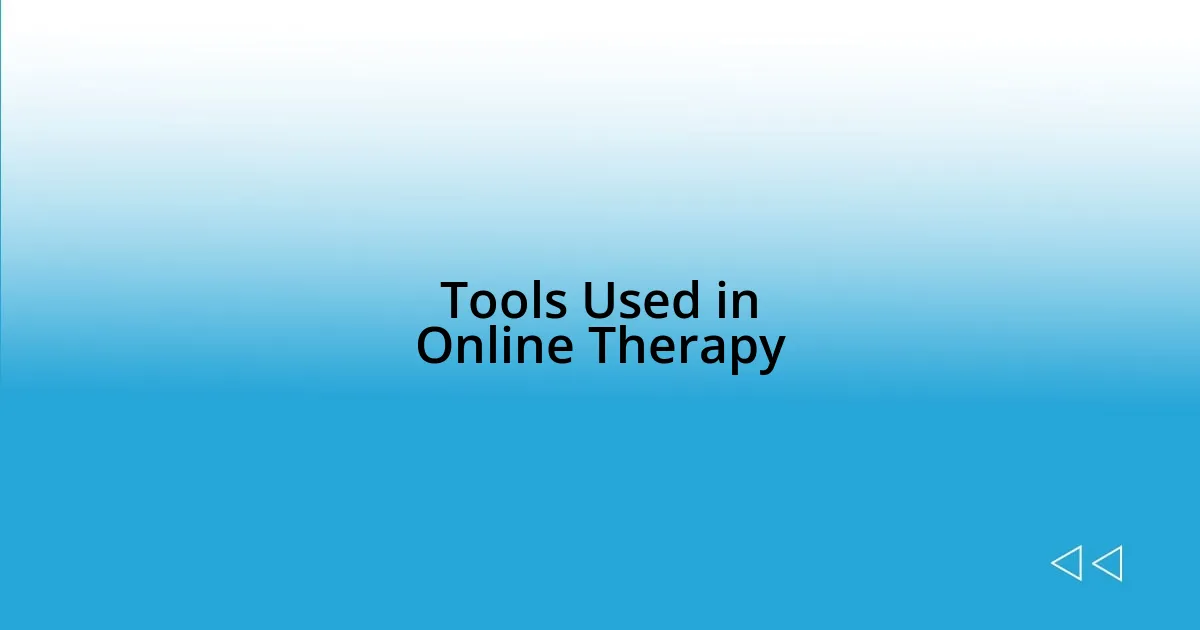
Tools Used in Online Therapy
In the world of online therapy, various tools play a crucial role in facilitating effective communication. For me, video conferencing platforms like Zoom or Skype stood out the most. The first time I logged in for a session, I was pleasantly surprised by how face-to-face interactions could be replicated through a screen. It made me wonder: how much of our emotional connection can transfers over technology?
Alongside video calls, chat and messaging platforms are becoming increasingly popular. I often relied on secure messaging for quick check-ins between sessions, which was a game changer. There’s something comforting about sending a text when I felt overwhelmed. It made me appreciate how flexibility in communication can provide additional support and a sense of presence in moments of need.
Lastly, digital tools for tracking progress, like journaling apps or mental health trackers, can enhance the overall experience. I remember incorporating a mood tracker at the suggestion of my therapist. That simple act of documenting my feelings made it easier to identify patterns over time, prompting deeper discussions. Have you ever tried tracking your emotions? It’s fascinating how much clarity it can bring to the therapeutic process.
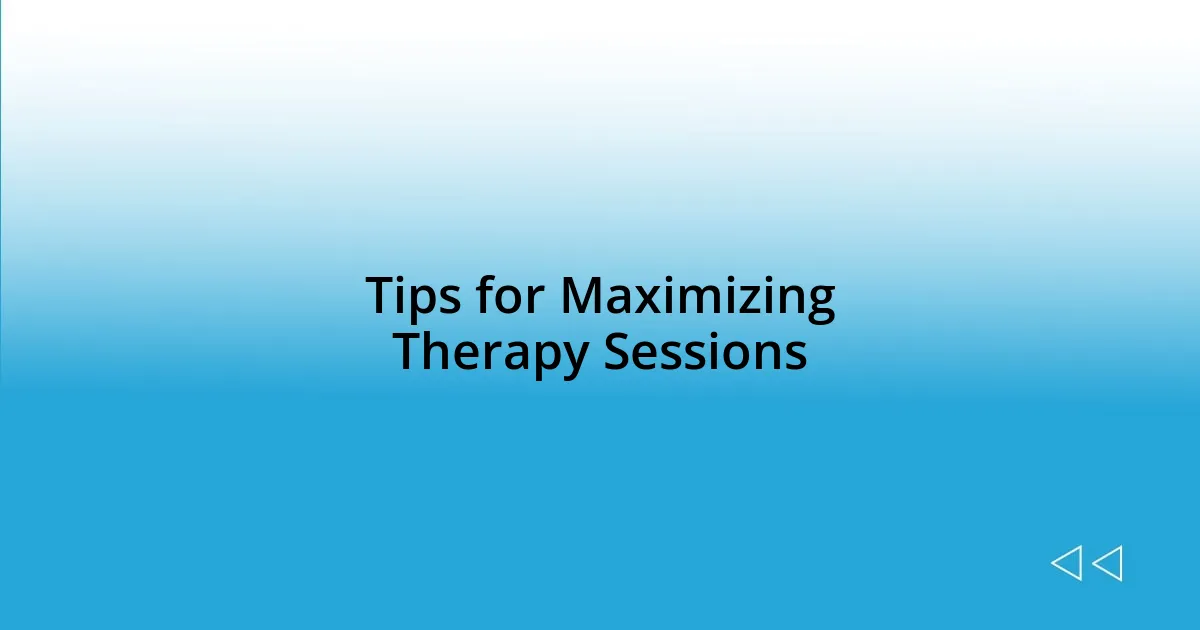
Tips for Maximizing Therapy Sessions
Maximizing the effectiveness of your therapy sessions involves being intentional about your approach. One tip that has worked wonders for me is coming equipped with specific topics or feelings I want to address. I often jot down my thoughts throughout the week, ensuring I can walk into the session ready to dig deep. Have you noticed how easy it is to forget what’s been bothering you when you don’t have notes? This practice can really change the focus and depth of the conversation.
Another vital tip is to be open and honest. There have been moments when I’ve hesitated to share uncomfortable thoughts, but letting them out always brings relief and clarity. I still remember when I finally expressed my fears about future uncertainty — it opened a floodgate of understanding, both for me and my therapist. It’s incredible how vulnerability can transform a session into a powerful tool for growth.
Lastly, consider taking a few minutes post-session to reflect on what you discussed. I’ve found that writing down key takeaways or insights helps solidify my learning. After one particularly enlightening session, I realized that revisiting my notes brought up new questions that I couldn’t wait to explore in our next meeting. What about you? Do you make time for reflection? It can be a game changer in keeping your therapeutic journey meaningful.











